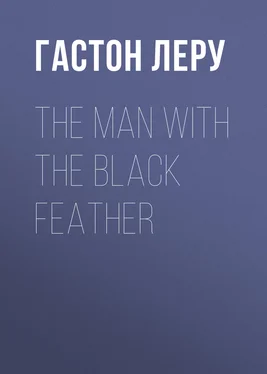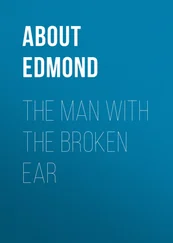Гастон Леру - The Man with the Black Feather
Здесь есть возможность читать онлайн «Гастон Леру - The Man with the Black Feather» — ознакомительный отрывок электронной книги совершенно бесплатно, а после прочтения отрывка купить полную версию. В некоторых случаях можно слушать аудио, скачать через торрент в формате fb2 и присутствует краткое содержание. Жанр: literature_20, Классический детектив, foreign_detective, на английском языке. Описание произведения, (предисловие) а так же отзывы посетителей доступны на портале библиотеки ЛибКат.
- Название:The Man with the Black Feather
- Автор:
- Жанр:
- Год:неизвестен
- ISBN:нет данных
- Рейтинг книги:4 / 5. Голосов: 1
-
Избранное:Добавить в избранное
- Отзывы:
-
Ваша оценка:
- 80
- 1
- 2
- 3
- 4
- 5
The Man with the Black Feather: краткое содержание, описание и аннотация
Предлагаем к чтению аннотацию, описание, краткое содержание или предисловие (зависит от того, что написал сам автор книги «The Man with the Black Feather»). Если вы не нашли необходимую информацию о книге — напишите в комментариях, мы постараемся отыскать её.
The Man with the Black Feather — читать онлайн ознакомительный отрывок
Ниже представлен текст книги, разбитый по страницам. Система сохранения места последней прочитанной страницы, позволяет с удобством читать онлайн бесплатно книгу «The Man with the Black Feather», без необходимости каждый раз заново искать на чём Вы остановились. Поставьте закладку, и сможете в любой момент перейти на страницу, на которой закончили чтение.
Интервал:
Закладка:
"But towards the ray, towards the unique ray, motionless and eternal, the faint, square ray, which from the beginning of ages took and preserved the form of the air-hole, I advance; I advance in a stumbling hurry, while the fever consumes me, blazes, and dizzies my brain. My feet stop, but with such a shock that one would believe them caught by invisible hands, risen from the soil; my fingers run over the wall, groping and fumbling that spot in the wall. What do my fingers want? What is the thought of my fingers? I had a pen-knife in my pocket; and all at once I let my green umbrella fall to the ground to take my pen-knife from my pocket. And I scraped, with certainty, between two stones. I cleared away the dust and mortar from between two stones. Then my knife pierced a thing between the two stones and brought it out.
"That is why I know I am not mad. That thing is under my eyes. In my quietest hours, I, Theophrastus Longuet, can look at it on my desk between my latest models of rubber stamps. It is not I who am mad; it is this thing that is mad. It is a scrap of paper, torn and stained—a document whose age there is no telling and which is in every way calculated to plunge a quiet manufacturer of rubber stamps into the wildest consternation. The paper, as you can guess, is rotted by the damp of the cellars. The damp has eaten away half the words, which seem from their red hue to have been written in blood.
"But in these words before me, in this document which was certainly written two centuries ago, which I passed under the square ray from the air-hole and gazed at with my hair rising on end in horror, I recognised my own handwriting."
Here copied clearly out is this precious and mysterious document:
"I rt uried
my treasures after betrayal
of April 1st
Go and take the air
at the Chopinettes
look at the Gall
look at the Cock
Dig on the spot and you
will be rich."
CHAPTER III
THEOPHRASTUS LONGUET BURSTS INTO SONG
On leaving the prison, Marceline and Adolphe were, very naturally, full of curiosity to learn the reasons of Theophrastus' extraordinary behaviour; and he had the greatest difficulty in getting them away from the subject. He treated the matter lightly, declaring that the whim had taken him to visit the cellars of the Conciergerie; and he had visited them. They were even more impressed by his attitude to the guide than by his actual plunge into the cellars. That Theophrastus, the timid Theophrastus, should have browbeaten not a mere man, but an official, amazed them. Theophrastus admits that he was as much amazed as they, and felt rather proud of himself. All the evening they kept recurring to the matter until their amazement and their interest began to weaken by mere continuance of expression. But Theophrastus was glad indeed when sleep at last tied Marceline's tongue.
The next day he shut himself up in his study on the pretext of straightening out his accounts. Its window looks down on to the little grass-plot in the middle of Anvers Square; and he leaned out over the sill, contemplating the prosaic reality of the scene as if he could not have enough of it. He was above all pleased by the nurses wheeling along their babies in perambulators and by the shouting of the children romping about the Square.
His thought was of a great unity and a great simplicity. It was entirely contained in the phrase: "The World has not changed."
No: the world had not changed. There were the babies in the perambulators; and as the clock struck two the Signora Petito, wife of the Professor of Italian who occupied the flat above his, began to play The Carnival of Venice .
No: nothing in the world had changed; yet when he turned round, he could see on his desk, among the models of rubber stamps, a scrap of paper.
Did that scrap of paper really exist? He had passed a feverish night, almost a night of delirium; and at the end of it he had decided that his strange adventure must have been a bad dream. But in the morning he had found the scrap of paper in a drawer of his desk…
Even now he kept saying to himself, "I shall turn round presently; and the scrap of paper won't be there." He turned round; and the scrap of paper was there— in his own handwriting .
He passed his hand over his perspiring brow and heaved the sigh of a grieved child. Then he seemed to come to a definite resolve and carefully put the scrap of paper into his pocket-book. He had just remembered that Signor Petito had a great reputation as an expert in handwriting. His friend Adolphe was also an expert in handwriting, but from the Spiritualistic point of view. He told the character by it. Theophrastus had no intention of calling Adolphe into counsel. There was already too much mystery in the affair to entrust it to the overflowing imagination of a medium who boasted himself a pupil of a Papus.
He went slowly upstairs and was ushered into Signor Petito's study.
He found himself in the presence of a man of middle age, whose chief characteristics were a mass of crinkly black hair, a piercing glance, and enormous ears. After they had exchanged greetings, Theophrastus broached the subject of the scrap of paper. He drew it from his pocket-book and an unsigned letter which he had written a few days previously.
"Signor Petito," he said, "I understand that you are a first-class expert in handwriting. I should be much obliged if you would examine this letter and this document, and inform me of the result of your examination. I assert myself that there is no connection—"
He stopped short, as red as a peony, for he was not in the habit of lying. But Signor Petito had already scanned the letter and the scrap of paper with the eye of an expert; and with a smile which showed all his exceedingly white teeth, he said:
"I won't keep you waiting for my answer, M. Longuet. The document is in a very bad state; but the scraps of handwriting one can read are in every respect the same as the handwriting of the letter. Before the Courts, M. Longuet, before God and before men, these two handwritings were traced by the same hand! " He laid his hand on his heart with a great air.
He entered into particulars: a child, he declared, could not make a mistake about it. He became oracular.
"The handwriting in both is equally angular," he said in a very pompous tone. "By angular, M. Longuet, we describe a handwriting in which the thin strokes which join the strokes of the letters and the letters to one another are at an acute angle. You understand? Look at this hook, and this one, and this thin stroke, and all these letters which increase progressively in equal proportions. But what an acute handwriting, M. Longuet! I have never seen handwriting so acute: it's as sharp as the blade of a knife! "
At these last words Theophrastus turned so pale that Signor Petito thought that he was going to faint. None the less he took the letter and the document, thanked Signor Petito, and went out of the flat.
He walked straight out of the house and wandered about the streets for a long while. At last he found himself in Saint-Andrew-des-Arts Place; then he took his way to Suger Street, and opened the latch of an old-fashioned door. He found himself in a dark and dirty passage. A man came down it to meet him, and recognising him, greeted him.
"How are you, Theophrastus? What good wind blows you here?" he said in affectionate tones.
"How are you, Ambrose?" said Theophrastus gloomily.
Since they had not met for two years, they had a hundred inquiries to make of one another. Ambrose was an engraver of visiting-cards by profession. He had been a printer in the Provinces; but having put all his capital into a new invention in printing, it had not been long before he found himself a bankrupt. He was a cousin of Marceline; and Theophrastus, who was a good soul, had come to his aid in the hour of his gravest trouble.
Читать дальшеИнтервал:
Закладка:
Похожие книги на «The Man with the Black Feather»
Представляем Вашему вниманию похожие книги на «The Man with the Black Feather» списком для выбора. Мы отобрали схожую по названию и смыслу литературу в надежде предоставить читателям больше вариантов отыскать новые, интересные, ещё непрочитанные произведения.
Обсуждение, отзывы о книге «The Man with the Black Feather» и просто собственные мнения читателей. Оставьте ваши комментарии, напишите, что Вы думаете о произведении, его смысле или главных героях. Укажите что конкретно понравилось, а что нет, и почему Вы так считаете.












